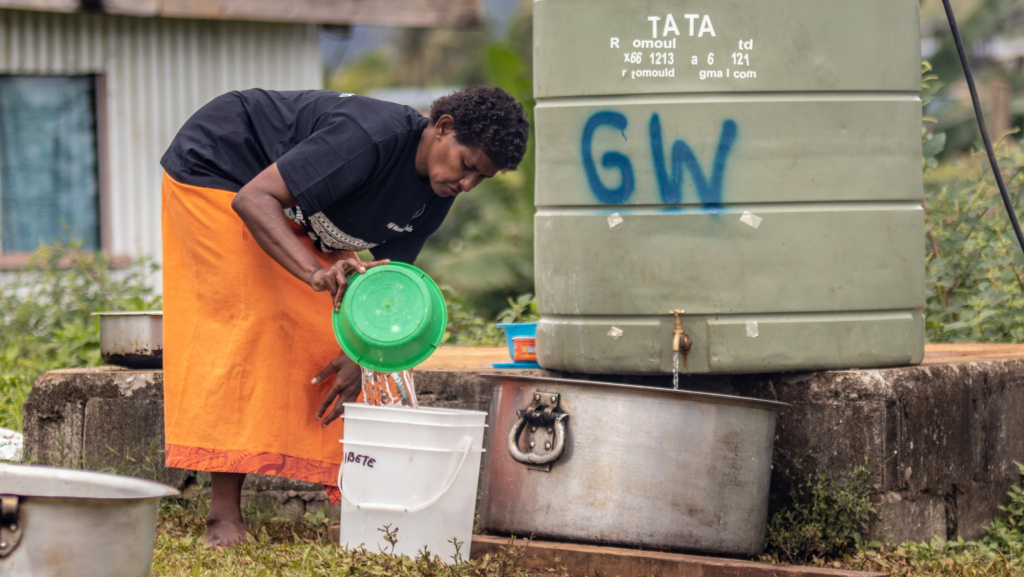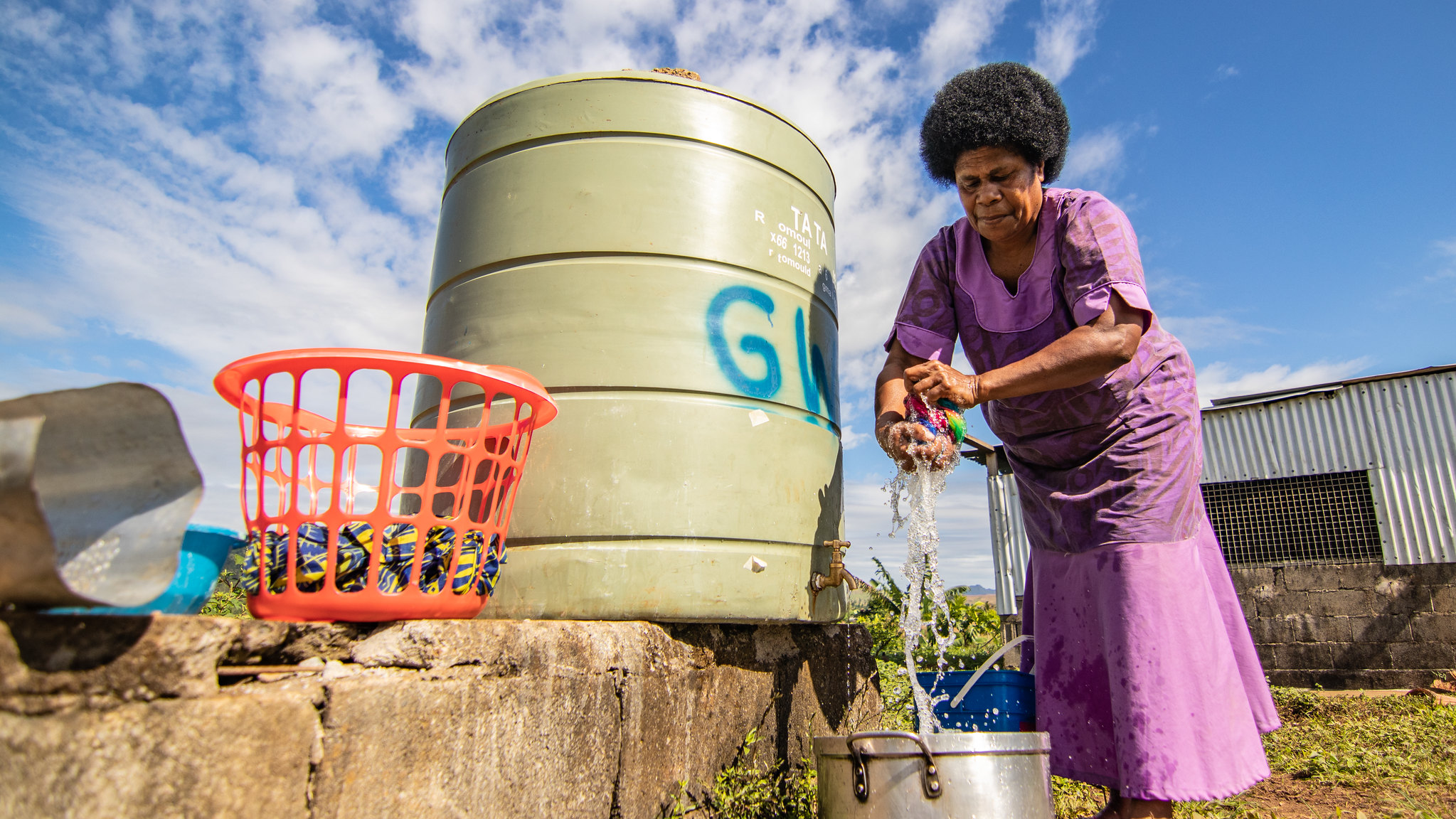Today is World Water Day. It is time to work together to accelerate change to solve the water and sanitation crises. In partnership with DFAT’s (Department of Foreign Affairs and Trade) and Water for Women, Habitat for Humanity Australia and Habitat for Humanity Fiji are working on improving Water, Sanitation and Hygiene services in Fiji through the Water for Women project.
Currently, women around the world will spend a collective 200 million hours a day searching for and collecting water (Water.Org). With women and children baring the primary responsibility for water collection. Our Water for Women Project in Fiji empowered women to ensure they are no longer burdened by the water crises. Water should be a source of health not harm.
What is Our Water for Women Project?
Our Water for Women Project was a successfully run 4.5yr long project in Fiji which aimed to strengthen community resilience and inclusion through improved water access, sanitation and hygiene (WASH) services.
Through the WfW Project, Habitat for Humanity Australia, in alignment with DFAT’s Aid Investment Program for Fiji and Fiji’s National Development Plan (NPD) alongside Habitat for Humanity Fiji, was able to increase agency of women in community WASH governance structure, improve community behaviors around inclusive water, sanitation and hygiene and improve access to water and sanitation infrastructure and services in the 18 communities and 11 schools.
The Water for Women project in Fiji helped over 980 households with a total population of 5021 in 18 communities and total of 1140 children and 69 teachers in 11 primary schools across the Ra Province and Ba Province.
Why Is Our Water for Women Important?
Climate Change is a major global issue. In the Pacific it is manifesting in increasingly frequent nature disasters such as Tropical Cyclone Harold and Tropical Cyclone Yasa in 2020. The impact of Climate Change also affects the quantity and quality of the fresh water supply in coastal and island regions, due to rising sea levels and changes in rainfall levels. This gives way to issues such as saltwater intrusion and slow replenishment of natural water resources. It also threatens human health, particularly in rural areas that do not have adequate sanitation.
What Were the Key Achievements of Our Water For Women Project?
The Water for Women project achieved four main objectives;
- Increasing agency of women in community WASH governance structures
- Improved community behaviours around inclusive water, sanitation and hygiene
- Improving access to water and sanitation infrastructure and services in prioritised communities and schools
- Key learnings from the project to be shared with organisational, local, national and international stakeholders.
Increasing agency of women in community governance structures
Increasing agency of women in community governance structures is crucial to changing the way WASH related issues are handled. Women are disproportionately affected in this space and therefore their voices not only provide diversity and insight but have also proven to make a difference when they are included and able to actively participate. Data has shown that inclusive water communities are working together and jointly taking responsibility to safeguard investment in infrastructure and ensure systems are well maintained, overall minimising operational costs.
The project provided an infrastructure for learning and a platform for advocating for sensitive gender issues in the patriarchal society; such as empowering women, youths and people with disabilities to participate in the communities’ water committees. The WfW Project provided a safe space to discuss barriers that prevent women and people with disabilities from actively participating in WASH committee. A total of 1736 people participated in community engagements and 201 participated in school engagements.
Improving community behaviours around inclusive water, sanitation and hygiene
In communities, people attended awareness training around health and hygiene, water borne diseases, treatment of drinking water and promoting behavioural change in the communities. As a result of the increased knowledge and understanding of WASH within the communities, there has been behavioural change in WASH practices such as increased hand washing with soap, and use of solar distillation to treat drinking water. Without these changes, we can’t achieve Sustainable Development Goal 6 – clean water and sanitation for all.
Teaching children in schools has been a key aspect of facilitating this behavioural change. Children who are educated on WASH often become a good influence and advocate for good WASH behaviours and practices to those close to them, including their parents and other caregivers. Teaching in schools also enabled us to effectively raise awareness on cultural barriers to behavioural change, such as talking about menstrual hygiene. Normalising conversations about things like menstruation overall improves understanding on maintaining proper hygiene.
Improving access to water and sanitation infrastructure and services in prioritised communities and schools
Through engagement with the communities and schools, the communities and schools themselves identified their priorities to best meet their needs with regards to water, sanitation and hygiene. Each water committee developed a Water Safety Plan, that included a water system assessment, water availability and accessibility, hazard identification and risk and control measures and development of a plan for each community.
Then, through community involvement in the construction of improved water and sanitation infrastructure, the project supported technical up–skilling of the community members.
Improving access to water and sanitation infrastructure and services in prioritised communities and schools
The WfW Project’s ground- up approach in strengthening community governance structure has been effective in fostering a strong policy decision-making environment and straightened the systems in place at the sub-national and national levels.
A pool of change agents inclusive of village heads, village nurses, health committees, water committees, Sunday day school teachers and youths have been well trained to improve governance structure at the community level so as to make it gender and disability inclusive.
Overall the project has been highly successful with each objective we set out with, achieved.
Our highlight of the project was seeing attitudes towards women gradually start to shift through increased knowledge and understanding of the value that women can add. The women’s perspective of themselves began to change from seeing themselves as more than just victims of discrimination but as agents of change for WASH development.

If you’d like to read more about the impact of our Water for Women project on the community read Adi’s story here.


